Anatomy of an Era: Coach Charlie McBride, Part 3
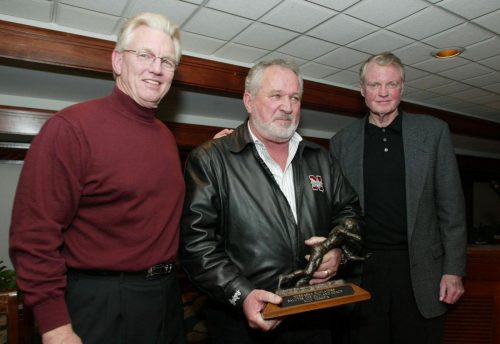
Excerpted from Chapter 72, No Place Like Nebraska: Anatomy of an Era, Vol. 2 by Paul Koch
Anatomy of an Era: Coach Charlie McBride, Part 3
Q: Do you think coaching Kenny Walker challenged you to be a better coach? Do you think having Kenny on the team affected guys on down the line in future years?
Charlie McBride: I had a deaf kid in Wisconsin and I had a little background of it, but I didn’t have the help I had at Nebraska with Mimi Mann. Mimi was really… oh, she was a saint. People don’t understand, there is no sign language for football terms. They had to make up their own, their own stuff. When I think back on it, I probably take the accomplishment of coaching Kenny to being the first deaf All-American in college football as the first, most satisfying thing I did in coaching. And when he made All–American and I told him, we both were crying. I was really emotional.

And Kenny has had a tough life afterwards and a lot of things have gone on in his life. It’s been hard to communicate with him because half the time I didn’t know where he was…. He was working in the weightroom all day and then he’d come home at 8 o’clock and the kids hadn’t eaten and the dishes were piled up in the sink….. And then he came back and was working on the weight staff, and the kids loved him and he would push them. But I’ve had a hard time getting ahold of him. And you can’t call him unless you have one of those special phones.
Q: That’s tough. I saw Coach Osborne last weekend and brought up my theory about the younger guys being inspired by seeing Kenny and his disability and how he excelled in spite of it, how he never let it hold him back. Would you agree with that?
CM: Oh, yeah. That’s a self-made point. It was obvious. Kenny, they tried to get him to play here and there and I think people gave up on him. And I said, ‘Hey, I’ll make a defensive lineman out of him.’ And at first I don’t know if he really thought that was a good idea, but it didn’t take long.
And I’d get mad at him in practice and he’d turn his back, (laughs) because he read lips. He wouldn’t look at me; He’d turn his back on me! And he was one of those guys who actually was a lot of fun to coach. And I mean, you talk about strong hands and stuff like that, and fast? This guy was fast! He just outclassed everybody as far as speed and everything. The experience of coaching him and having Mimi there and watching tape and watching film, she was a lot of fun to be around and was there for anything, any kind of help you could give him. They loved him at the Broncos, and then Dan Reeves left and they made a mistake. The owner, believe it or not, in all his great wisdom, said in the paper that they cut Kenny because of his disability. It cost him about X-hundred thousand. He didn’t even get to court on that one. You can say a lot of things, but you can’t say that.
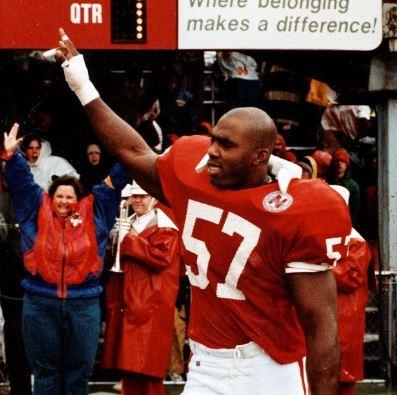
Q: I hear so many stories of you and Milt taking your guys down to the pit in old Schulte Fieldhouse. Was there a reason you guys went down there?
CM: We had that extra room there, but when we were upstairs in the old fieldhouse we could use that to do one-on-one work and stuff like that. So it was kind of a good deal, because we were both out of everybody else’s way outside. When you have that many guys you start running into each other.
Q: I always hear of a few fights now and then. I figured it was your way of toughening them up a little bit, doing some of that hand-to-hand combat…
CM: I think, in reality, Milt and I would get mad at each other and yell at each other… and the kids loved that. (laughs)
Q: What would you get mad about?
CM: ‘They’re holding! You’re holding all the time!’ It wasn’t anything where we’d get in each other’s face, but when that happened kids would start to get in a little tussle and push each other around a bit. And when you’d go one-on-one it would get a little heated. But the thing that came out of that was they got closer and they really formed a bond with each other. It wasn’t just offense over there and defense over here. And I got to be just as good of friends with the offensive guys as I was with the defensive guys.
And here I had a birthday recently and they must have put it in the newsletter for the N Club or something. I got as many letters and e-mails from offensive linemen as I did defensive linemen. I got one from Terris Chorney, the old offensive lineman up in Canada. Andy Means, I got one from him. Turman, I got one from him. Offensive guys.
Q: What is it about guys from Chicago? What factor did they play in the group dynamic?
CM: You know, I don’t know that. I truly don’t. When you look back at the really good kids, the really good ones that I got out of Chicago? They were all from the same high school. And I knew the high school coach for a long time, knew what kind of kids they were, because you didn’t play for him if you weren’t that way. There were kids that had gone on to the Big Ten there and the coach would tell me, “No. They wouldn’t fit in at Nebraska.” And almost to the “T”, he was right, they either went there and quit or did something, most every one.
Mike Murray, Nate Turner, Eddie Stewart, those guys were great. Mike is back in Chicago and driving a garbage truck and he’s living in the house next door to the one I was born in. It’s crazy. When he told me the address I couldn’t believe it. We were in a two-flat where we lived on the second floor across the street from the elementary school there. Mike, he was just one of those kids that was so tough, too tough for his own good.

Available on Amazon.com
And Nate was a guy that was probably the best receiver, one of the top three or four receivers in the United States when he was coming out of high school. Everybody was offering him. And he only scored one touchdown the whole time (at Nebraska), but he did a lot of stuff. He ended up playing fullback, actually, for the Buffalo Bills. He got so big.
Of course, Eddie had a chance and played a little bit with the Rams, and now he’s the Assistant Commissioner of the Big 12. He was at Missouri as the Assistant Athletic Director and got his masters at Michigan State and worked there, so he’s got a pretty good background now, and he’s got a chance to do something with himself. He’s smart and he’s a worker. I remember, I brought him in as a strong safety and he was moved to linebacker and he wanted to quit, “I don’t want to play linebacker.” That’s all our linebackers were was strong safeties, except for our middle linebackers like Carlos Polk and John Hesse and Damkroger and some of our bigger guys. Those were our big, strong guys who didn’t have to run so much outside, they just took care of the middle and had to hang in there.
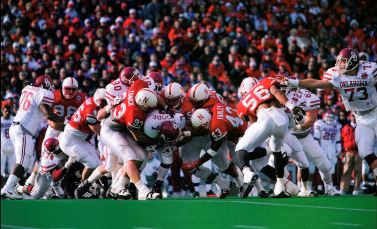
Q: What was it about Nebraska kids? Anything that made them different from others?
CM: Work habits. I’m sure there is one, but I don’t remember any kid -off the top of my head- I cannot name a kid that didn’t work hard, that ever went into a game and just took a dump, didn’t play hard, didn’t at least give it all he had.
And there are some better than others. And you know, I just think they were a blue-collar bunch of kids, even the guys from Minnesota. Maybe it’s the climate, maybe it’s something else about them, they’re just kind of hardcore guys that were workers, and worked hard. Kind of knew what it took. ”If you wanna be good”, like Christian always used to say, “..if you want to be the best you have to play the best.” Kids say some strange things once in a while.
Q: From the mouths of babes?
CM: You know, Christian and Jason always played together, and Tom was always worried about them getting into fights in a game. I was worried about them fighting with each other in a game, (laughs) because they’d blame each other for something. Shit, they’d beat each other up. I remember one day Jason broke Christian’s nose in the backseat of a car. They were fighting.
There was some stuff. (laughs) But I tell you what, you get on the field and you better set your jaw. I remember when Christian was with the Bears and they got him in camp and they said, “Oh, my God.” The guys on the offensive line were going, “Get this guy outta here!” (laughing) But he tore his thumb up so bad he couldn’t play anymore. And I tell you what, Christian’s dad had a five star French restaurant and Christian, he was the maître d’ there, and people would stop by and say that he is now the most kind, nicest guy. And Christian really is a nice kid, but he can be who he wants to be. You don’t want to just go and call him something strange. And of course, Jason had the neck problem and then got into other problems, as you know, but he’s doing pretty well now. I probably talk to him a couple times a month. A lot of these guys, I still talk to a lot. Eddie Stewart, I spoke with him a couple weeks ago.
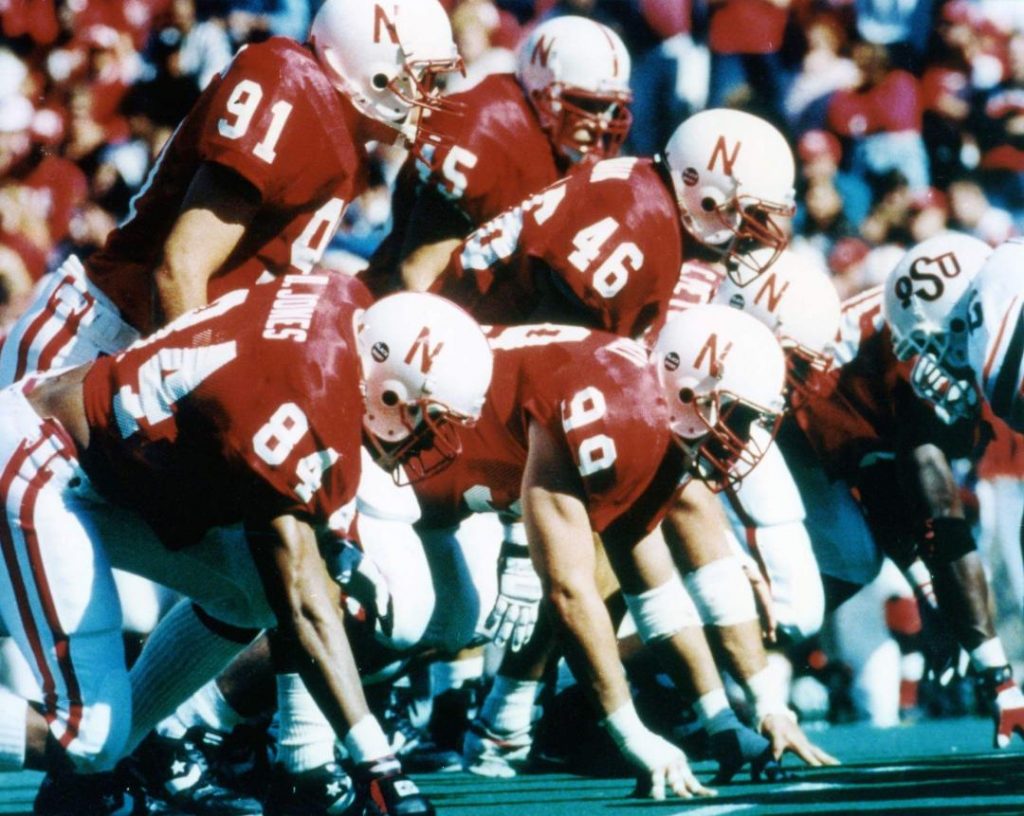
Q: Last question, Coach, was there anyone during those years who really meant something special to you?
CM: Milt Tenopir. Yeah, I don’t think there’s any question Milt was as good a line coach as you could find in the country.
And I think Tom being the offensive coordinator -and this is nothing against Tom- Tom wasn’t one to stand up and say, “I’ve got the best offensive line coach in the world.” Tom just wasn’t that way. That could be a reason why a lot of us never did get head jobs, and that’s just Tom. That’s just the way he is. You know, Tom doesn’t use the word ‘great’, he uses the word ‘good.’ Unless this guy’s a great player, I’ve never heard him hardly use the word ‘great.’ “The guy’s a good player” or “He’s a good coach.” And he may be the best the guy’s ever had, but, “He’s a good coach…” You know how he is. You might go to sleep with him telling you right in front of you. (laughs)
I think Milt Tenopir really had a lot to do in developing those offensive football teams. Year after year he would reload, and I don’t think he ever got the credit he deserved. He was always the guy who really worked at it and really knew the offense. He knew what they could do and what they couldn’t do, and I think when time went on and Tom left it got a little rougher on him. That’s something else. Anyway, I think he’s the one guy on our staff who never kinda got his due. And everybody knew Milt, but there’s just something extra. God, the kids loved the heck out of him. He’s like me, he doesn’t care about all the other crap. The players: that’s why you do this.
And then you look at what guys are making now, and they can’t dent the snow if they pissed hard against it. I mean, some of these coaches making $300,000 a year?! We were lucky… I think my last year I made $104,000 and that was just my last six months. And we got bonuses for bowl games. Bill Byrne did a good job of getting us three months’ salary if we won a national championship. We’d get one month’s pay for going to the game, two months’ for winning the bowl game and three months’ for winning the national championship game. He did some things for the coaches and we had two-year rotating contracts, so we always had a year on our salary, so if you got fired or something you still had a year. That’s not a bad deal for a guy.
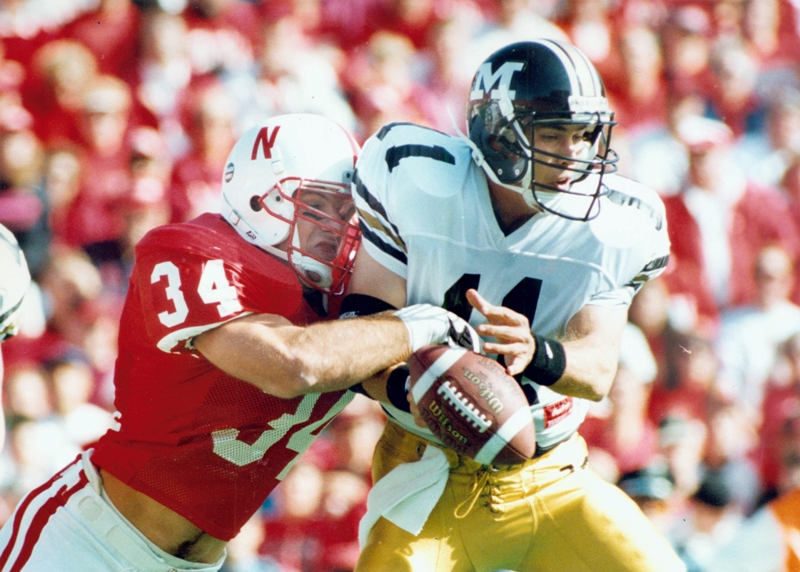
AppleMark
Another person I think that meant a lot to me, who I got a lot of guidance from and a lot of things was Al Papik. Al’s a guy I think the world of. He’s straightforward and he doesn’t butter things up and he tells you the way it is in his own, right way. I’d go, ‘Al, are you kidding me?’ And he’d say, “Well, the answer’s ‘no’.” (laughs) I’d say, ‘Thank you. You’re wasting your breath with this other crap.’ (laughs) He was a guy that I really had a lot of respect for.
And I think a lot of guys stayed because of Tom, a lot of guys -with the continuity of the staff- was good. We kind of all knew what the right hand was doing as well as the left, and you didn’t have to coach a new coach every year. I remember at Wisconsin I had a new staff of guys every year. It was awful. We’d lose somebody -and I did the whole playbook every year- I was, ‘Jesus, my wife is ready to kill me.’ But I think that’s the one guy I would say was special. And Milt was special to me; he was good to me and we were good friends.
And the other guy that I would say would be Mike Corgan. Mike was a different guy: he made his own wine and beer and worked in his garden and had every tool in the world. If you needed tools you went to Mike. And between he and Milt and I, the three of us hung out a little bit together. And we’d be over in Mike’s backyard, Mike would smoke his pipe and drink beer and we’d sit over in his yard. There were some good times. Mike took me under his wing and told me when to shut my mouth and when not to. (laughs)
Q: Thanks so much for your time, Charlie. I’ll take that as my cue to do the former. (laughs)
End conversation.
Praise the Lord for giving the world some ‘Chicago guys.’ Salt of the earth & tough as nails, but tender as a rose petal once you gain their friendship or secure a seat in their inner circle. Such was the case with Charlie McBride. If some of the other conversations we’ve had thus far seemed too pointed in their fact-finding, too serious in tone, too structured, this was my time to follow the gut instinct and let it all flow free-form, improvising and experimenting like a Charles Mingus or a John Coltrane. I like what we got here, because it showed us the man behind the sideline scowl, the set jaw, the clenched fist and stern, discerning eye. Did we find the same demeanor and mannerisms following him off the field in retirement? Yes. And no. The fire still burns in his belly, that much is evident. But to much surprise, that fire just happens now to glow in the belly of a Teddy Bear. Charlie McBride is a lover, simply put. Robert Browning penned, “”Take away love, and our earth is a tomb.” Well, Charlie lived! And lived it to the fullest, I might add. The Blackshirts’ foes may have felt like death warmed-over the following week, but he and his posse operated above ground, kicking up the dust and spitting tobacco juice to keep it down all the same.
Odd, but he not once mentioned an opposing player, team, big game, or even a national championship. Nothing. Zero. Zip. It was about the kids… all about the kids and only about the kids. I conclude that he was a process-oriented, player-oriented individual, more a task-hound and strategist than a scoreboard and polls watcher. It was all about grabbing the troupe by their proverbial collars and dragging them through a week’s worth of jungle, preaching avoidance of quicksand traps, anxiously anticipating their eventual joy at the successful completion of the perilous jaunt, “I think the whole thing, when I look back on it, my whole pay was (witnessing) the kids in the locker room when you won.” As for his position as spokesperson of the Milt Tenopir Admiration Society, I was tickled when he shared, “He’s like me, he doesn’t care about all the other crap. The players: that’s why you do this.” So true. But there was also the challenge: “You’re challenged every day because you’re teaching, and that’s a challenge in itself.” With the cast of characters Charlie was given, I’ll heartily agree on that one hundred percent.
If you’ve ever read my short write-up in Rich Wolfe’s 2008 book For Nebraska Fans Only, you’ll have known the affinity I’ve always held for Kenny Walker. Not because of his deafness, but in spite of it. In all ways a tale worthy of its own in-depth examination, the teamwork and verve with which Kenny, Mimi Mann and Charlie took on such a project is inciting and spiritually rousing. It softened my hard heart when Charlie mentioned it as his greatest success: “I probably take the accomplishment of coaching Kenny to being the first deaf All-American in College Football as the first, most satisfying thing I did in coaching.” Charlie chooses his words judiciously, so this was a profound statement. ”And when he made All–American and I told him, we both were crying.” I sure wish that moment could have been shared with a seventy-six thousand-plus Memorial Stadium crowd… there wouldn’t have been a dry eye in the house. Washington Irving once wrote, “There is a sacredness in tears. They are not the mark of weakness, but of power. They speak more eloquently than ten thousand tongues. They are messengers of overwhelming grief… and unspeakable love.” Love reigned in Lincoln. Charlie was its dark prince.
Then there was his personal brand of tough love. Far from lilacs and lilies and little puppy dog tales, the man’s verbally grotesque barrages could peel a car’s paint. In all ways the antithesis of Tom Osborne’s communication model, he could be rough, often threatening, personal, and even belittling. But it had a purpose and was only aimed at those he felt could withstand the assaults. Charlie made sure of that. And if you couldn’t cut the mustard? Well, maybe you weren’t Charlie McBride/Blackshirts material anyhow. ”Tough luck, buddy. Leave your helmet and pads at the equipment room’s counter on the way out.” It was all part and parcel to his brand of tough love: “Toughness is being able to make yourself do things you don’t want to do.” Sometimes that meant Charlie hugging a kid even if he was still a bit steamed. That’s toughness. Humility, too. And love. The greatest of these was love.
Notable quote #2:
Charlie McBride on the wisdom of patience: “…as you go on you learn things from Coach Osborne, some of the intangible things. One of the things was patience. I probably learned that more in my career at Nebraska than anywhere, because we had a walk-on program.”
Copyright @ 2013 Thermopylae Press. All Rights Reserved.
Photo Credits : Unknown Original Sources/Updates Welcomed
Author assumes no responsibility for interviewee errors or misstatements of fact.